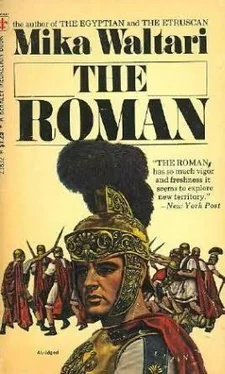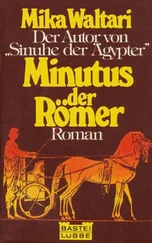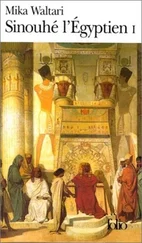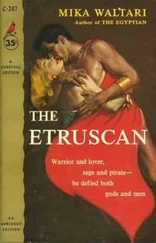Mika Waltari - The Roman
Здесь есть возможность читать онлайн «Mika Waltari - The Roman» весь текст электронной книги совершенно бесплатно (целиком полную версию без сокращений). В некоторых случаях можно слушать аудио, скачать через торрент в формате fb2 и присутствует краткое содержание. Жанр: Исторические приключения, на английском языке. Описание произведения, (предисловие) а так же отзывы посетителей доступны на портале библиотеки ЛибКат.
- Название:The Roman
- Автор:
- Жанр:
- Год:неизвестен
- ISBN:нет данных
- Рейтинг книги:4 / 5. Голосов: 1
-
Избранное:Добавить в избранное
- Отзывы:
-
Ваша оценка:
- 80
- 1
- 2
- 3
- 4
- 5
The Roman: краткое содержание, описание и аннотация
Предлагаем к чтению аннотацию, описание, краткое содержание или предисловие (зависит от того, что написал сам автор книги «The Roman»). Если вы не нашли необходимую информацию о книге — напишите в комментариях, мы постараемся отыскать её.
The Roman — читать онлайн бесплатно полную книгу (весь текст) целиком
Ниже представлен текст книги, разбитый по страницам. Система сохранения места последней прочитанной страницы, позволяет с удобством читать онлайн бесплатно книгу «The Roman», без необходимости каждый раз заново искать на чём Вы остановились. Поставьте закладку, и сможете в любой момент перейти на страницу, на которой закончили чтение.
Интервал:
Закладка:
In his cowardice, Domitian guessed that no one would think of looking for him in the Jewish section ctf the city, for the Jews hated Vespasian and his whole family because of the siege of Jerusalem and the losses his fateful pmcer movement had caused the Jews when the rebels had attempted to fight out in the open field.
At the mention of losses, Apollonius of Tyana again tried to intervene on the side of the Greeks in the internal struggle for power in Alexandria. As he left Vespasian before going on board the Nile boat I had bought him, he said, “I pricked up my ears when I heard that you had destroyed thirty thousand Jews in one battle and fifty thousand in another. Even then I thought: Who is this man? He could do better things. The Jews have long betrayed not only Rome but also the whole of mankind. A people who seek to isolate themselves from all other peoples, who will not eat or drink in the company of others and even refuse to perform the usual traditional prayers and incense offerings to the gods, such people are more distant from us than Susa and Bactra. It would be better if there were not a single Jew left in the world.”
The wisest man of our times spoke so intolerantly that I was glad to finance his journey and earnestly hoped his boat would sink or the Nubian savages would impale him on a roasting spit. Naturally his eternal talk about democracy disturbed me most. Vespasian leaned far too far toward righteous meditation and gave more thought to the good of the people than to his own advantage as Emperor.
Without doubt Apollonius of Tyana possessed supernatural powers. Later we decided that he had in fact seen the Capitoline burning in his mind’s eye as it was actually happening. Several days later Domitian crept out of the Jewess’s cellar and insolently proclaimed himself Emperor. Naturally the Senate must bear some of the responsibility for this, for they thought they would profit more from having an eighteen-year-old on the throne instead of Vespasian, who was used to giving orders if necessary.
Domitian avenged his terror and humiliation on Vitellius by having the people hang him on a pole in the forum by his feet and then slowly kill him with dagger pricks. His body was then dragged to the Tiber on an iron hook. For this reason, too, never entrust yourself to the arbitrariness of the people. Love your people as much as you wish to, my son, but discipline your love.
We did not yet know all this in Alexandria. Vespasian was still hesitating over the form of government, although he had been proclaimed Emperor. Republicanism was dear to him, as it was to all the older senators. We discuss it often and gladly, but do not act foolishly because of that. Apollonius’ ecstasy did not convince him, for the slow postal system gave him no chance to investigate the truth of his vision. Then the priesthood in Alexandria confirmed his own divinity so that all the prophecies of a century which had spoken of an Emperor from the East would at last come true.
One hot morning, when Vespasian was sitting in judgment outside the Serapis temple where he had had his judge’s podium set in honor of the gods of Egypt, two sick men were brought before him and asked for help. One was blind and the other lame. Vespasian had not wished to try, for outside the temple a great crowd had assembled to stare at the Emperor and he had no desire to make a fool of himself before the people.
But I was seized with a feeling of having experienced all this before-the temple columns, the judge’s seat and the crowd. I even seemed to recognize the two men. Suddenly I remembered the dream I had had in my youth in the land of the Brigantes. I reminded Vespasian of it and urged him to try to do what I had seen him do in my dream. Reluctantly Vespasian rose and spat a great blob of spittle into the eyes of the blind man, then kicked the lame man hard on his leg. The blind man regained his sight and the lame man’s shriveled foot grew well again so rapidly that we could hardly believe our eyes. Then Vespasian at last believed that he had been born to be Emperor, although after this event he did not feel any holier or more godlike than before, or if so he hid all such feelings.
I know for certain that he never again tested his powers in this way, though once I asked him to put his divine hand on my bleeding rectum when he came to see me on my deathbed. Vespasian refused and explained that his strange experience in Alexandria had affected him to such an extent that he had seriously feared he would become deranged. “Rome has had enough deranged Emperors,” he said. I must admit that one could not expose Rome to such a threat, not for your sake or that of my own health.
Many people who believe only what they themselves can see, hear and smell, however misleading the human senses can be, are inclined to disbelieve my story, for the sorcery of Egyptian priests is famous. But I myself can certify that the Serapis priests examine a patient extremely carefully and ascertain whether he is really ill before they practice faith-healing on him. In their view, pretense and a cure of an imaginary illness would be an insult to the gods.
I know that Paul was also very particular as to whom he allowed to receive his sweat-clothes as a cure for serious illnesses. He would mercilessly banish from the Christian community a man pretending to be ill. So judging from my own experience, I consider that Vespasian really did cure the two sick men, although I do not wish to explain how such things are possible. I also admit that Vespasian is wise not to wish to test his ability further. The loss of strength suffered in faith-healing is probably great.
It is said of Jesus of Nazareth that he could not bear anyone secretly touching even the tassels on his cloak, for he could feel his strength ebbing away. He did cure the sick and raise the dead, I know, but only when begged to, or from compassion for their kin. In general he seems to have set little store by his miracles. He used to criticize those who saw but did not believe and praise the blessed who believed although they had never seen. Or so I have heard told. Not that my own belief weighs more than a grain of sand. I am very much afraid that it will not be sufficient for him, but I shall at least try to be honest to him.
Speaking of Egyptian miracles makes me think of a Greek there who had used his inheritance and his wife’s dowry for insane inventions. This madman insisted so stubbornly on an audience with Vespasian that we finally had to receive him. With shining eyes, he told us about his inventions and especially praised the power of steam from water, which he believed would drive the heaviest grindstones.
“What would we do with the slaves who live by turning the grindstones?” asked Vespasian. “Try to calculate how many unemployed the St ate would then have to support.”
The man calculated rapidly in his head and admitted honesdy that he had not thought of the damage to the national economy his invention might cause. Hopefully he went on to explain that the power in boiling water could be used to drive oars, if only he had enough money to make some necessary experiments. Then ships would no longer be dependent on the winds, as merchant ships and warships are.
I intervened at this and explained how appallingly inflammable the expensive grain ships would be, not to mention passenger ships, if one were forced to have fires constantly burning on board to heat the water. Already the cooking of food on board had shown itself to be so dangerous that at the slightest sign of a storm the cooking-fire had to be extinguished at once on its bed of sand. Every seaman preferred dry food to exposure to fire at sea.
Vespasian remarked that the Greek trireme has been, is, and always will be the most brilliant weapon in sea warfare, although on the other hand, he admitted, the Carthaginian merchant ships were the best in the world and there was no reason for altering them.
Читать дальшеИнтервал:
Закладка:
Похожие книги на «The Roman»
Представляем Вашему вниманию похожие книги на «The Roman» списком для выбора. Мы отобрали схожую по названию и смыслу литературу в надежде предоставить читателям больше вариантов отыскать новые, интересные, ещё непрочитанные произведения.
Обсуждение, отзывы о книге «The Roman» и просто собственные мнения читателей. Оставьте ваши комментарии, напишите, что Вы думаете о произведении, его смысле или главных героях. Укажите что конкретно понравилось, а что нет, и почему Вы так считаете.











